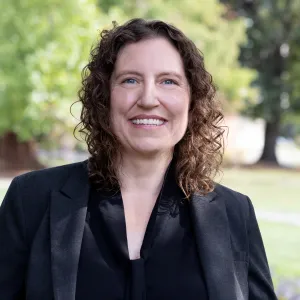Master of Arts in Teaching
The Master of Arts in Teaching (M.A.T.) is designed for students who are planning to teach in elementary, middle or high schools and for those wishing to do advanced study in the field of education.
Grounded in the liberal arts, Smith’s M.A.T. teacher preparation program combines the study of the learning sciences, human development, and educational and social theory with intensive experiences in the classroom. Our program will help you learn to differentiate your instruction to meet the diverse needs of today’s learners and help you find creative ways to motivate and guide students to become active participants in their own learning.
Summer education courses for teachers run from June 30 through August 1, 2025. Find course information in Requirements & Courses.
Requirements & Courses
- Understand the role of cultural and human diversity in the design and practice of education.
- Understand current theories of learning and how they shape principles of pedagogical practice across ages and subject matter.
- Understand current theories of human development—infancy through adolescence.
- Understand the major factors that influence the design of learning environments.
- Develop applied and practical knowledge and skill to support the growth and success of beginning teachers. (These learning goals are elaborated in the description of our state approved teacher preparation programs.)
A minimum of 32 semester hours and final course grades of B- or better are required for completion of the M.A.T. degree. Graduate students pursuing Massachusetts Educator Licensure at the elementary level are required to participate in the summer semester.
Professional Teaching Knowledge (Pedagogy) Requirements
-
EDC 556 Learning in Classrooms (summer)
-
EDC 511 Sheltering Instruction for English Language Learners (summer)
-
EDC 338 Children Learning to Read (fall)
-
EDC 548 Student Diversity and Classroom Teaching (fall)
-
EDC 554 Design of the Learning Environment (fall)
-
EDC 345s Elementary Teaching Methods (year-long course)
-
EDC 552 Perspectives on American Education (spring)
-
EDC 559 Clinical Internship in Teaching and Reflective Seminar (spring)
Subject Matter Knowledge
All students seeking Massachusetts Educator Licensure must have an undergraduate major in the liberal arts and sciences. Prior to entering the M.A.T. program, the student and adviser will review the student’s undergraduate transcript for subject matter preparation in the following areas:
Literature
- Must include American, British, and world literature
History
- Must include U.S. history, colonial to present, and/or American government, including the founding documents
- World history and European history, ancient to present
Natural Science
- Must include one lab science
Mathematics
- Must include 9 credits of college-level math courses
Social Sciences
- Must include the studies of economics and geography
Electives
-
EDC 342 Growing Up American: Adolescents and Their Educational Institutions
-
EDC 343 Multicultural Education
-
HST 390 Teaching History
-
ENG 399 Teaching Literature
-
Others options available, with consultation of adviser
A minimum of 32 semester hours and final course grades of B- or better are required for completion of the M.A.T. degree. Graduate students pursuing Massachusetts Educator Licensure at the secondary level are required to participate in the summer semester.
Professional Teaching Knowledge (Pedagogy) Requirements
-
EDC 556 Learning in Classrooms (summer)
-
EDC 511 Sheltering Instruction for English Language Learners (summer)
-
EDC 548 Student Diversity and Classroom Teaching (fall)
-
EDC 554 Design of the Learning Environment (fall)
-
EDC 352 Methods of Instruction (fall)
-
EDC 559 Clinical Internship in Teaching and Reflective Seminar (spring)
-
EDC 552 Perspectives in American Education (spring)
-
Subject specific methods (semester dependent on subject area)
Subject Matter Knowledge
Students must have an undergraduate major in the liberal arts or sciences.
All candidates must meet subject matter knowledge requirements identified by the Commonwealth of Massachusetts. Students work with advisers from the department to choose subject matter courses that complete the requirements for subject matter knowledge in the subject/area they seek licensure.
Teaching Practicum
Students complete their teaching practicum in one semester, teaching daily, from approximately 7:30 a.m. to 2 p.m.
Workload
Students are encouraged to take only three courses during their student teaching semester.
Smith College is pleased to offer graduate courses during the summer, available to M.A.T. students, area teachers and those studying education at other institutions. In our five-week summer session, teachers can earn four or eight credits (90–180 PDPs). Teachers successfully completing EDC 511 will earn their Sheltered English Immersion Endorsement in Massachusetts.
Courses Offered
New Program: Additional Licensure in Special Education/Moderate Disabilities (PK–8 or 5–12)
The following two special education courses provide the necessary competencies for additional licensure in moderate disabilities. Individuals who hold initial or professional teaching licenses and complete both EDC 550 and EDC 551, take the appropriate MTELs, and complete a 150 practicum or internship with a licensed teacher in moderate disabilities are eligible to apply to the Massachusetts Department of Elementary and Secondary Education for an additional license in moderate disabilities, grades PK-8 or 5-12.
EDC 550 The Policies and Procedures of Inclusion
This course will focus on the laws and policies governing special education, including eligibility categories and determinations, testing and creating useful assessment reports, progress monitoring, writing and implementing IEP and 504 plans, working collaboratively with agencies and other service providers, and assistive technology. Credits: 4
EDC 551 The Inclusive Classroom: Designing Effective Instruction
This course will focus on the models of instructional practice for students with mild to moderate disabilities, including models of co-teaching and inclusion, differentiated instruction, universal design, positive behavioral supports and effective classroom management practices. Students will learn strategies for supporting students in reading, writing, and mathematics, as well as with executive function and study skills. This course requires fieldwork in an inclusive classroom. Credits: 4
For More Information
Questions about the summer offerings should be directed to Lynn R. Dole, coordinator of teacher education, 413-585-4650.
Tuition & Costs
Fees and aid for graduate students will be based on the number of credits in which the student is enrolled on the 15th day of each semester. After that deadline, fees and aid will be changed only if the Administrative Board gives special permission, and only if the change adds to your total number of credits.
Graduate students enrolled in fewer than 8 credits pay on a per-credit basis at the rate of $2,100 per credit and are not eligible to receive institutional financial aid.
2025–26
| Number of Credits | Cost per Semester |
|---|---|
| 16 and more credits (full-time) | $33,570 |
| 12 to 15 credits (full-time) | $25,200 |
| 8 to 11 credits (part-time) | $16,800 |
All students in the 12-credit M.A.T. program are awarded a scholarship totaling $34,400. This equals $18,500 out-of-pocket for tuition.
2025–26
| Direct Billed Costs | Cost (U.S. dollars) |
|---|---|
| Tuition (based on 16 credits) | $67,140 |
| Summer course tuition (one-time charge) | $2,500 |
| Health insurance (domestic students may waive) | $3,588 |
| Indirect Costs Not Billed | Cost (U.S. dollars) |
|---|---|
| Living expenses | $14,656 |
| Books, course materials, supplies, and equipment | $800 |
| Transportation (domestic average) | $640 |
| Personal expenses | $8,698 |
| Unsubsidized loan fee (average) | $170 |
To ensure that Smith students are in full compliance with Massachusetts Minimum Requirements for School Entry and Smith College’s policy, Smith’s Health Services requires that health and immunization information be submitted prior to arrival. Visit the Schacht Center website to access a copy of the health form and view instructions to upload the required health forms. Completion of health requirements is required before students are able to register. The health form deadline is June 15 for summer and fall enrollment, and January 19 for spring admissions. Questions about the health requirements can be directed to healthservices@smith.edu.
The Commonwealth of Massachusetts also requires all students to meet specified minimum requirements for health insurance coverage. If you have comparable health insurance by a U.S. carrier, you may appeal to Gallagher Student Health and Special Risk to see if you are eligible to waive the Smith health insurance. All domestic students are required to complete an online decision form, whether enrolling in or waiving the plan. International students may not waive the Student Health Insurance Plan. They will be automatically enrolled and charged for insurance. You can fill out the online form and review available plan information on the Gallagher Student Health website.
The spring-only student health Insurance rate is $2,093 for the 2025–26 academic year. Insurance rates for spring 2026–27 have not been set. The 2025–26 annual rate was $3,588. If you do not wish to be charged, you must submit a waiver by the published deadline.
For more information, visit the Student Health Insurance website. Questions about the student health insurance plan and the waiver process can be directed to SFS@smith.edu.
Coverage Periods
| Coverage Type | Coverage Period |
|---|---|
| Standard annual coverage | August 14–August 14 |
| January graduates/fall-only students* | Ends January 14** |
| Spring-only students | January 15–August 14 |
*Students on leave for spring
**Will not be charged for spring semester
Review of applications for the M.A.T. program begins November 1 and ends April 15. Non-degree applications are due August 15 for fall entry, January 15 for spring entry, and June 15 for summer entry.
Scholarship assistance is provided to all students who are admitted to the Master of Arts in Teaching Program. If you are interested in a federal student loan, please see the Financial Aid website.
Overview & Admission
“Not only did I have a great experience with every educator working within the program, but I felt highly prepared when I started my first year of teaching.”
Faculty
“Through multiple in-person teaching experiences, mentoring and feedback loops, Smith’s M.A.T. program sets you up to successfully enter any classroom.”
Project Coach Graduate Fellowships
Contact Department of Education & Child Study
Morgan Hall
Smith College
Northampton, MA 01063
Phone: 413-585-4650
For more information about the M.A.T. program, contact Lynn Dole, coordinator of teacher education. For admission information, contact Martha Potyrala, Graduate and Special Programs Operations Coordinator.








